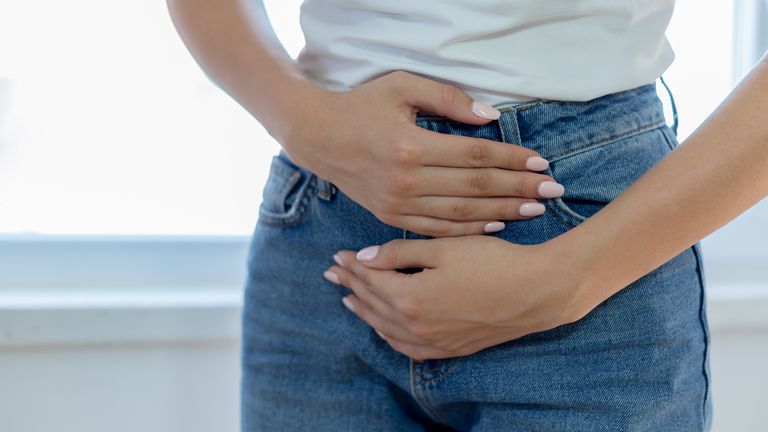COVID-19: More than 13,000 women report changes to periods after having vaccine but experts say fertility not affected
Women's fears, in part rooted in conspiracy theories promoted by anti-vaccination groups online, are unfounded, experts agree, as there is no evidence to believe the COVID jab affects fertility.
Wednesday 7 July 2021 14:42, UK
The number of women reporting changes to their menstrual cycle linked to having a COVID vaccine has risen to 13,000.
The figure has increased from around 4,000 women last month.
The Medicines and Healthcare products Regulatory Agency (MHRA) has so far received more than 13,000 reports from women across the country who have experienced changes to their period after having the vaccine.
Latest updates on COVID from the UK and around the world
Experts say there is no evidence to believe the coronavirus vaccine affects fertility, but there are reports that some women are refusing to get the jab.
Dr Viki Male, a reproductive immunologist at Imperial College London, said women should feel confident getting the jab and that reports of changes are not unexpected, as similar reactions have been observed with the flu vaccine.
She told Sky News that 25% of women who contract COVID-19 also see changes to their period.
"We know that sex hormones affect the immune system and the immune system affects sex hormones and we have some evidence that the flu vaccine, given a certain time in your cycle, can slightly dampen the amount of progesterone you have, and it's the balance between oestrogen and progesterone that builds up and breaks down the lining of your uterus.
"So if these get slightly out of whack then we might expect to get a heavier period or a later period," she said.
These reports have led to fears among some women that the vaccine could affect fertility, fuelled in part by conspiracy theories promoted by anti-vaccination groups online.
As a result, experts are concerned that increasing numbers of young women are hesitant about the vaccine or refusing to have it altogether, putting pressure on the government's plan to unlock the country as it relies heavily on high numbers getting vaccinated.
Dr Male said there is no scientific link between the vaccination and fertility issues and warned that women can be more susceptible to problems during pregnancy if they contract COVID-19.
She said: "We have quite a lot of evidence that these vaccines don't reduce your chances of getting pregnant.
"In the clinical trials, people were asked not to become pregnant but nonetheless accidents happen.
"Across the four vaccines that were approved in the UK, 65 people became pregnant by accident and they became pregnant equally in the vaccinated and the unvaccinated group, which tells us that the vaccine isn't reducing people's chances of getting pregnant.
"Now that the vaccines have been more widely rolled out, we also have studies in IVF clinics where they keep a track of how likely you are to become pregnant if you're vaccinated, compared to if you're not vaccinated.
"Again, being vaccinated does not reduce your chances of getting pregnant in an IVF setting."
She added: "COVID itself is not without harm, even if you are a young and healthy woman.
"If you catch COVID in late pregnancy it is associated with an increased risk of pre-term birth, stillbirth, needing intensive care and your baby needing intensive care.
"So people who are really actively thinking about getting pregnant in the near future might actually even be keener to get the vaccine than they would be otherwise."
Dr Pat O'Brien, vice president at the Royal College of Obstetricians and Gynaecologists, added: "There's no plausible biological mechanism by which the vaccine could affect fertility, and there's no evidence whatsoever that it does affect fertility.
"There are even some early studies related to fertility treatment that show that there doesn't seem to be any difference at all between people who haven't had the vaccine and people who have had the vaccine or indeed people who've had COVID and have COVID antibodies."





